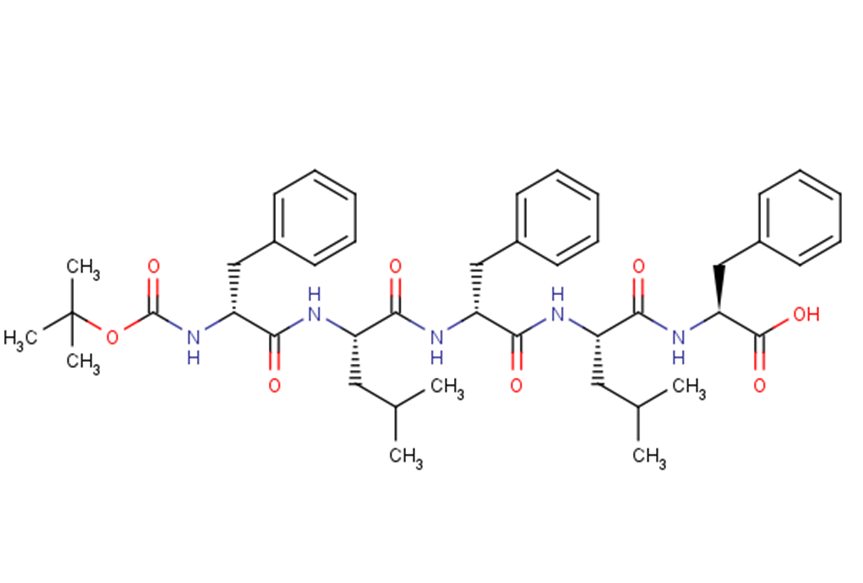
N-Boc-Phe-Leu-Phe-Leu-Phe
CAS No. 148182-34-7
N-Boc-Phe-Leu-Phe-Leu-Phe ( —— )
产品货号. M29911 CAS No. 148182-34-7
N-Boc-Phe-Leu-Phe-Leu-Phe (Boc-FLFLF) 是一种甲酰肽受体 1 (FPR1) 拮抗剂,可增加疼痛作用并抑制膜联蛋白的抗疼痛活性。
纯度: >98% (HPLC)
 COA
COA
 Datasheet
Datasheet
 HNMR
HNMR
 HPLC
HPLC
 MSDS
MSDS
 Handing Instructions
Handing Instructions
| 规格 | 价格/人民币 | 库存 | 数量 |
| 2MG | ¥569 | 有现货 |


|
| 5MG | ¥878 | 有现货 |


|
| 10MG | ¥1642 | 有现货 |


|
| 25MG | ¥2801 | 有现货 |


|
| 50MG | ¥4126 | 有现货 |


|
| 100MG | ¥5875 | 有现货 |


|
| 200MG | 获取报价 | 有现货 |


|
| 500MG | 获取报价 | 有现货 |


|
生物学信息
-
产品名称N-Boc-Phe-Leu-Phe-Leu-Phe
-
注意事项本公司产品仅用于科研实验,不得用于人体或动物的临床与诊断
-
产品简述N-Boc-Phe-Leu-Phe-Leu-Phe (Boc-FLFLF) 是一种甲酰肽受体 1 (FPR1) 拮抗剂,可增加疼痛作用并抑制膜联蛋白的抗疼痛活性。
-
产品描述N-Boc-Phe-Leu-Phe-Leu-Phe (Boc-FLFLF) is a formyl peptide receptor 1 (FPR1) antagonist, which increases pain effects and inhibits antinociceptive activity of annexin. Boc-Phe-Leu-Phe-Leu-Phe is used extensively in FPR research.
-
体外实验——
-
体内实验——
-
同义词——
-
通路Others
-
靶点Other Targets
-
受体FPR1
-
研究领域——
-
适应症——
化学信息
-
CAS Number148182-34-7
-
分子量785.97
-
分子式C44H59N5O8
-
纯度>98% (HPLC)
-
溶解度In Vitro:?DMSO : 100 mg/mL (127.23 mM)
-
SMILES——
-
化学全称——
运输与储存
-
储存条件(-20℃)
-
运输条件With Ice Pack
-
稳定性≥ 2 years
参考文献
产品手册




关联产品
-
5-Methylcytosine
5-甲基胞嘧啶是真核 DNA 中发现的甲基化核苷酸碱基。在动物中,胞嘧啶 DNA 甲基化形成 5-甲基胞嘧啶主要存在于回文序列 CpG 中。在植物中,甲基化序列是CpNpGp,其中N可以是任何碱基。 5-甲基胞嘧啶是由 DNA 甲基转移酶作用形成的表观遗传修饰。
-
Ac-β-Endorphin (huma...
Acetyl-β-Endorphin (human) 是一种多肽,能够由多肽筛选发现。多肽筛选是一种主要通过免疫测定法而集合活性多肽的研究工具。多肽筛选可用于蛋白互作、功能分析,抗原表位筛选,特别是活性分子研究和开发领域。
-
p-Ethoxybenzoic acid
4-Ethoxybenzoic acid is a compound of luminescent bioapplication.



 021-51111890
021-51111890 购物车()
购物车()
 sales@molnova.cn
sales@molnova.cn







